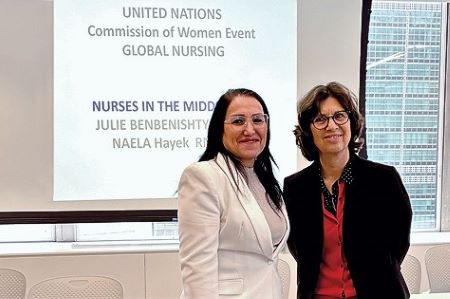
On a rainy March morning, a roomful of mainly nurses took their seats at a United Nations Commission on the Status of Women (UN CSW) side event, ready to hear how the panelists were taking global nursing into the future.
The morning session, “Nurses of the Middle East, South, and Central America Promoting Caring, Collaboration, and Cooperation through Shared Educational Experiences,” included two pioneering senior trauma nurses who worked side by side for decades at the Hadassah Medical Organization, one Jewish, one Arabic: Julie Benbenishty, RN, MSN, Ph.D., and Naela Hayek, RN, MP. In 2011, the two had founded Nurses in the Middle East, the focus of the UN CSW session. Its mission? “Nurses in the Middle East is an Israeli-Palestinian joint organization to promote regional health and connect nurses to each other, regardless of political, ethnic or religious identity.”
“To me, they represent the best of the United Nations, even though they’re not affiliated. Every day they carry out [its] vision,” said Dr. Holly Shaw, UN representative of the International Council of Nurses, who had invited Benbenishty and Hayek to speak at the UN CSW event. They are “informative, instructive exemplars of the best values of collaboration in commitment to humanity I can imagine.”
Benbenishty, who was recently named an ambassador for the World Federation of Critical Care Nurses, was born in the United States, making aliyah at 16. In Jerusalem, she studied medicine at the Henrietta Szold Hadassah-Hebrew University School of Nursing, where she now teaches. She also serves as vice president of the European Federation of Critical Care Nurses. After serving as a nurse in the Israeli army, she began working at Hadassah Hospital, where she’s been in the ICU since 1978.
“I’m from the north of Galilee, I’m Arabic, and I’m proud to be here — and to present to you,” said Naela Hayek, who is the national head nurse of the Ministry of Welfare and Social Security and who spoke of her 29 years working in the Hadassah ICU with Benbenishty.
The warm relationship between the two, built over decades of treating trauma patients and the fallout of terrorism together, was what led them to establish a nonprofit organization of nurses in the Middle East dedicated to health promotion, nursing continuing education, and regional conferences to transcend political and social borders. Their first conference took place in Jordan with 21 nurses — they now have 140.
Today, Benbenishty and Hayek have expanded their specialized clinical nursing programs, which began with a pilot program for 15 nurses at Augusta Victoria Hospital in East Jerusalem to receive advanced training at Hadassah. Now they have eight Israeli—Palestinian hospitals participating, with around 480 nurses. For them, this is more than just a way to make sure patients in the West Bank and Gaza get health equity. “We believe we can create a calmer coexistence,” said Benbenishty.
In addition to clinical training, joint research will be a key part of their work, providing “a cross-border model for peace-building and closing skills gaps in the nursing field. This builds on smaller studies which show the potential for cross-border healthcare training to help build mutual respect and understanding.”
“Our small steps started when I had a 45-year-old truck driver from Hebron, the victim of a bad accident… We invested three months of daily care, the best care possible. When he was finally discharged, he had to go back to the West Bank, which had no facilities for his continuity of care,” said Benbenishty.
“The health—care inequalities he was facing — that he was going to have a different outcome compared to my Israeli patients, that they would have better opportunities for health care — necessitated a nursing network.” And so she and Hayek began navigating an intricate web of red tape and bureaucratic hurdles to create their nonprofit, with a goal of bringing continuity of care to their Palestinian patients at Hadassah after they’d left the hospital and returned to their local communities.
“We live in a society of Jews and Arabs with open wounds,” Benbenishty said, literally and figuratively. “Can nurses heal a bleeding, wounded people?”
It seemed clear, that morning across the street from the UN, that these two already are, by taking the small steps that can lead to big change.
